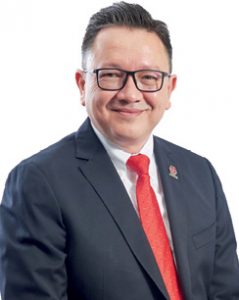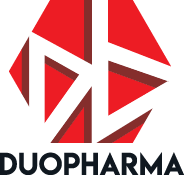
Leonard Ariff Abdul Shatar
Group Managing Director, Duopharma Biotech Berhad
COVID-19 COSTS are likely to persist in 2022, i.e., the cost of testing for Covid-19, treating patients, and administering vaccinations.
The Group Managing Director of Duopharma Biotech, Leonard Ariff Abdul Shatar, said access to quality and affordable healthcare would be vital in 2022 due to the economic impact that Covid-19 has had on large segments of the population.
“This is especially important for non-communicable, chronic diseases such as diabetes and hypertension. As we gradually transition to the ‘endemic’ phase of the pandemic, it is also vital to ensure that vaccine access is universal to reduce the risk of new variants, said Leonard Ariff.

“The need to administer ‘booster’ shots is also essential to maintain the protection of the vaccines.”
He said some domestic regulations will need to be amended to adapt to the new way of engaging/transacting. One of them will be the Poisons Act when ordering Controlled Items that cannot be vaccines.
“Cost of implementing digitisation can be financially taxing to healthcare players and customers. With possible waning effects of the Covid-19 vaccines, there is still a cautious opening of the economy, but we have to be prepared for sudden lockdowns again.”
He said cash flow management was the key challenge for every industry during the pandemic. Sufficient cash flow is required to sustain the business. Duopharma Biotech did experience a challenging cash position. Still, the organisation quickly changed its mode to “cost-saving”, where operational expenses were reduced significantly (15 per cent) to ensure the sustainability of the business.
“Supply of raw materials and packaging materials during the period of the pandemic was one of the critical challenges that we faced. Hence, Duopharma Biotech has always evaluated this risk and holds three to six months’ worth of buffer stocks to ensure no disruption of medication supply to the healthcare facilities.
“We have also learnt that relying on sole suppliers was a risky action. Hence Duopharma Biotech has begun to evaluate alternate suppliers for raw materials and packaging materials to ensure continuity of supply.”
He said agility was a crucial factor in ensuring the company could change direction swiftly and adapt to the new normal to ensure these changes were managed without impacting the business.
Engaging with customers, too, has evolved rapidly from traditional face-to-face meetings to visual contacts via emails, telephone and video calls, and text chats. There is an urgent need to embark on digital initiatives in the healthcare sector.
Then there is the issue of market volatility. There was a spike in specific ranges of products (i.e. immune-boosting products) but a sharp drop in others (i.e. prescription medicines). There was also cost escalation of critical consumables (i.e. gloves, masks, filters, single-use bags etc.) and difficulty securing these consumables.
He said the lack of support and disruption in the global value chain reduced access to expertise to troubleshoot machinery, supply of critical spare parts, raw and packaging material from overseas. There was also increased Cost of Goods Sold (COGS) due to various impacts in logistics, material scarcity, and businesses closing down.
Competition will intensify
He said the impact on its international business was due to travel restrictions and volatile freight costs.
Delay/challenges with technology transfer activity due to border closure – Highly potent Active Pharmaceutical Ingredients (HAPI) technology transfer activity was severely impacted.
“Consumers are getting more conscious of the availability of halal-certified pharmaceutical products (e.g. consumer healthcare products/halal vaccine) in the market. Halal certified pharmaceutical products are considered more hygienic and higher quality, thus giving consumers peace of mind.
“The pandemic and ‘work from home/work from anywhere’ culture that arose in response to this has also taught us the importance of embracing digital innovations in healthcare and corporate culture.”
On challenges in 2022, Leonard Ariff said disruption in the global supply chain continues due to volatility of freight availability and charges. The volatility of the market is expected to continue.
He said the competition would intensify with many niche technology companies coming to the forefront (i.e., digitalisation, diagnostics, precision medicine, gene and cell therapy, etc.). The industry is now moving towards patient-centric value creation, driving the advancement of digitally enabled, on-demand and seamlessly connected clinician-patient interactions
“Telemedicine is expected to be a focus area. However, there is a lack of local expertise and differentiation between market players. Halal pharmaceutical is still regarded as an emerging sector in most of the world, and there are various interpretations of what defines halal pharmaceutical. There are still questions about whether it is needed or not.
“As part of the Halal Pharmaceutical standard development committee under the Standards and Metrology Institute for the Islamic Countries (SMIIC) Organisation of Islamic Cooperation (OIC) standard, we are pleased that a SMIIC/OIC Halal Pharmaceuticals has been drafted and is under active deliberation.”
Leonard Ariff was asked about the opportunities available in Malaysia for halal vaccines and his plans to increase their halal vaccine share further.
He replied:” To be a local halal vaccine hub for the production of halal vaccines and leverage on the fact that the majority of the population were Muslims. There is also increased demand for halal vaccines.”
The importance of innovation and technology
Duopharma Biotech believes it is essential to move with the times and cater to the increasing needs of the consumers and patients who are getting more educated and demand better and more cost-effective health solutions – be it in treatment or prevention.
“With the help of technology, there will be more precise tools/devices to predict hence prevent an illness, as well as a more targeted treatment to patients to increase the chance of complete cure and reduce the adverse reactions to the treatment.
“As the proverb goes ‘change is the only constant’, innovation always leads to new ideas and changes. Innovation is the key to the future; it is important to ensure that we stay afloat and be competitive in the market.”
Leonard Ariff said technological advancement in the pharmaceutical sector was a key area as the world is focusing on ‘Industrial Revolution 4.0’ and ‘telehealth’. For instance, the use of ‘My Sejahtera’ application during the pandemic helped healthcare workers evaluate patients’ health remotely or without visiting.
“Technology is an essential enabler in the pharmaceutical sector, with the inclination of the country as a whole towards Industrial Revolution 4.0. The pharmaceutical industry is moving towards Pharma 4.0.”
With that said, the elements of a smart factory have been identified and being rolled out in phases in Duopharma Biotech. With Pharma 4.0, the industry will see some tremendous disruption, which will steer the pharmaceutical industry towards a better growth avenue, becoming more self-sustaining and lean in operation and management.
“The company is also constantly looking at integrating innovation and new technologies not only into the manufacturing line but throughout the entire company’s ecosystem. We strongly believe that new technology, for example, digitalisation, automation and Artificial Intelligence (AI), when used correctly, are key to bringing the company to the next level.”
Going by this vision, a total investment of more than RM300 million is allocated and expected to be spent over five years. All the investments will have the elements of digitalisation, automation and AI, which are fundamentally essential in spurring innovation.
A clear vision
“Ultimately, the technology that we invested in shall drive towards making our product safer and higher in quality. Thus, it should be beneficial to our customers and society.”
He said technology and innovation disruptions were here to stay, and Duopharma Biotech had identified this as the core focus area relevant for now and in the future. Particularly in the pharmaceutical industry, the technology and innovation landscape has constantly evolved rapidly, and thanks to the pandemic for accelerating it further.
On Duopharma Biotech’s technological capabilities, Leonard Ariff said it could develop and manufacture various dosage forms to cater to market needs.
“We have the full suite of in-house abilities from R&D to manufacturing, and cold-chain distribution can cater to such special medical needs.
“Duopharma Biotech as a company has a clear vision where we constantly strive to be better and ‘be the benchmark’ when it comes to quality, new technological capabilities and innovation. We rolled out Manufacturing Optimisation Strategy back in 2015. We looked at a comprehensive short and middle-term investment strategy, focusing on enhancing technical capabilities and spur innovations.”
Duopharma Biotech has the first high technology biosimilar plant in Malaysia; this plant can produce pre-filled syringe products used for patients with renal issues. It also has the first oncology manufacturing plant and leads the country to manufacture oncology products. It is expanding with new molecules to ensure it can cater for affordable medications to the public.
Covid-19’s impact on digital transformation
Leonard Ariff said Duopharma Biotech has always focused on digitalisation even before the pre-pandemic era, but certainly, during the pandemic, the transformation rate has spiked 10-fold.
“We recently came up with a short and long-term strategy to map the digital transformation based on the horizon scanning and other relevant indicators.
“There is an increased need to digitise and automate many processes, including manufacturing-related processes. With talks of big data, the internet of things (IoT) and data mining, the Covid-19 era has made the team work more closely in preparation for the digital transformation plan and the usage of digital avenues to increase efficiency and productivity.”
On the rising healthcare costs in the country, Leonard Ariff said Duopharma Biotech has embarked on several initiatives related to operational excellence to improve manufacturing efficiency and productivity.
The company recently initiated a new source evaluation programme to ensure sustainable and uninterrupted product supply by securing more potential inventory suppliers. It is thus able to procure the inventories with much better commercial packages.
“All in all, through these exercises, we believe that Duopharma Biotech would be able to contribute towards containing the rising cost of healthcare in the country.” KHIRTINI K KUMARAN — The Health








